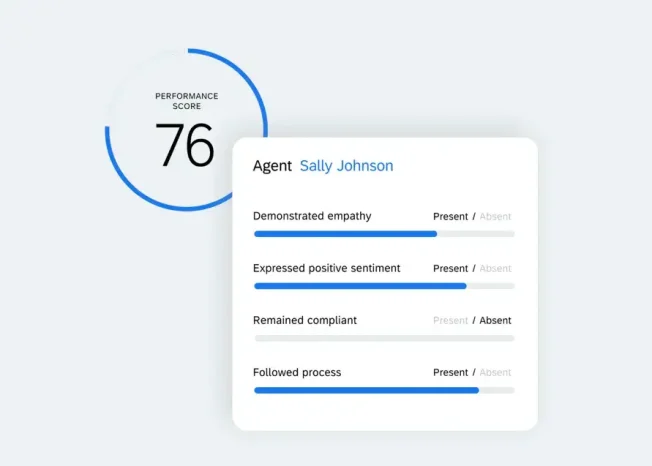In an extremely competitive, consumer-led business environment, customer service has never been a more important part of your overall offering.
Customer service is the practice of providing help and support to both new and existing customers. It can take place before, during, and after a sale. It is an essential part of your overall customer experience and customer retention strategy.
Your customer service skills can make or break the relationship you have with your customers – securing them as lifelong loyalists or acting as the final straw that sends them to a competitor. To exceed customer expectations here, you’ll need to proactively foster best-in-class customer service skills across a wide range of customer touchpoints and channels.
Free eBook: How to improve agent effectiveness
But what’s the difference between barebones support and outstanding customer service skills? And what qualities do customer service professionals and customer service agents need to be able to deliver memorable, positive customer interactions?
Here’s everything you need to know…
Benefits of good customer service skills
When your customer service teams demonstrate good customer service skills, they’re able to solve issues or guide customers quicker – while demonstrating calm, clarity, and enthusiasm. That means customers end every interaction feeling positive about your ability to meet their needs, and are ready to purchase from you again.
In that sense, your customer service skills are a fork in the road – they can salvage what could otherwise be a jumping off point for a customer and turn it into a positive outcome they’ll remember when making future purchasing decisions.

Ultimately, customer service is a cornerstone of the overall customer experience. Getting that experience right is vital; in our 2025 Consumer Trends research, we found that more than half (53%) of bad experiences result in customers cutting their spend.
So, businesses that nurture excellent customer service skills and – by extension – deliver market-leading customer support and great service, consistently win out over their competitors:
- People are 38% more likely to recommend a company if they rate its customer service positively
- 3 in 4 consumers say a bad interaction with a business can ruin their day
- 93% of customers are likely to make repeat purchases with companies who offer excellent customer service
- 80% of customers believe that the overall customer experience is as important as products or services
Here’s the important thing to remember: customer service occurs at every step of the buying journey, and across a range of touchpoints. That means there are plenty of core skills that, if carefully fostered, can help your customer service teams deliver truly great omnichannel customer experiences – the kind people keep coming back for.
So let’s dig into some of the most important skills to have.
12 critical customer service skills
1. Active listening skills
Customer support is about more than nodding along and then reverting to a script. While keeping your messaging on-brand and compliant is important, it’s also key that people feel as though you’re actively listening and understanding what they need.
Active listening actually happens in a couple of scenarios. When speaking to customers – say on the phone or in a store – you’ll want customer service reps who know how to stay invested in what’s being said. But active listening is also a customer service skill that can be unlocked with the right digital tools. If you have experience management software that can proactively search for customer feedback, for example, you’ll be demonstrating active listening in the digital space if you use what you learn to improve the customer journey.
2. Empathy
Real empathy is the ability to put yourself in others’ shoes and understand a person’s emotions. It’s showing people that, should they be experiencing difficulties, you can relate, sympathize, and reassure them that you know that issue must be a pain.
While empathy is an everyday human skill as much as a customer service one, it’s still a trait that needs to be worked on and trained. Practicing empathy with our guide to empathy statements is a good starting point for customer service teams looking to level up their emotional intelligence.

3. Communication skills
Listening is one thing, but can your teams on the front lines relay information and solution-driven communications with clear communication skills in a way that leaves little room for misinterpretation? Being able to speak clearly, concisely, and responsively to what’s happening – no matter the situation – is the gold standard for customer service professionals.
4. Patience
Sometimes customers get annoyed, and sometimes they’ll take that frustration out on whoever’s available. As the frontline of the customer experience and the external face of your business, customer service team members will sometimes get the brunt of an irate customer and their emotions – so it pays to be able to take a breath, stay calm, have a positive attitude, and stay in control of the conversation. Patience is a virtue, and plays a crucial part of customer service anywhere.
5. Adaptability
Customer needs can change on the fly. Sometimes someone will call with what seems like a simple issue, only for things to spiral into something else entirely. Other customers might walk into a store with their heart set on a particular product, only for further investigation to reveal that it might not be the right fit for their needs.
Approaching this requires adaptability – with customer service professionals ready and capable of delivering a quick response and handling curveballs without skipping a beat.
6. Problem solving skills
Customer service is, at heart, about conflict resolution; your customers will have questions they need answering, and problems that need solving. Being able to think laterally and navigate the flow of each interaction towards the most logical solution is a hugely important skill – one that requires a keen understanding of the wider context as well as every possible avenue for resolution that the business has in its arsenal.
7. Attention to detail
Leaving no stone unturned will help ensure that customer queries don’t leave themselves open to repeating themselves. For customer service agents, that can be as simple as double checking names, account numbers, and customer information to ensure that they fully understand the situation. They say the devil is in the details, so going the extra mile will help make sure that problems don’t escalate and situations are resolved effectively.

8. Teamwork
Helping customers and streamlining their experience often requires more than one member of the support team. That might be because you have to route a call to a different department, it might be someone in the contact center picking up from a colleague who was handling an inquiry on social media, or it could just be deferring to a member of store staff who handles returns.
In every case, being able to work as part of a wider team will help things feel slick and professional – and that’s likely to help get their query solved faster.
9. Product knowledge
Customer service agents ought to know their organization’s product or service catalogue back to front, with an encyclopedic knowledge of what’s available, possible discounts, workarounds to known issues, company policies, and alternatives. Customers expect agents and frontline staff to be fountains of knowledge on everything on offer – but this is a skill that is built up through training and experience, rather than an inherent trait.
10. Tech literacy skills
Similarly, anyone interacting with customers in the modern business environment needs to be well-versed in all the channels and digital tools at their disposal. Tech literacy doesn’t require innate, genius levels of wizardry; it just means taking proactive steps to ensure that any frontline staff are fully trained on the software and solutions they’ll use in their day-to-day work.
11. Time management skills
Customer service can bring with it time constraints. In busy contact centers, customer service agents will often be up against targets to resolve a certain percentage of calls first time – and to be able to get through each interaction in a timely manner – enabling them to handle any waiting customers.
That pressure can be alleviated with the right contact management software, but it also helps to have a good sense of time – especially when it comes to knowing how long any given interaction should take versus time spent. This isn’t a case of rushing customers off the phone, though; it just means being able to keep an eye on the time and knowing when to move things along.
12. Follow-up skills
In an ideal world, customer service interactions would all be resolved in the moment. That’s not always the case, but even if it is, it pays to have people onboard who have a good mix of memory, empathy, and due diligence in following up on outstanding – and even closed – tickets. Following up with genuine curiosity and purpose is a surefire way to deliver a positive customer experience, build trust, and boost customer loyalty.
How to build customer service skills
When we talk about customer service, we don’t just mean people manning the phones in a contact center. Strong customer service skills also apply to frontline staff speaking to customers in stores, teams manning social media accounts, and interactions along the customer journey that also encompass sales, marketing, and product development departments.
That means there’s a lot of opportunity to help, but it can also make the prospect of effective customer service management feel somewhat daunting.
What’s important to note is that our list above includes some skills that are inherent human traits and some that are qualities that require training and development to nurture.
But, in both cases, the right frontline and contact center software can help. The Qualtrics® Experience Management Platform®, for example, can lighten the load and help boost customer service skills in a number of ways:
Automating relevant contact center work
Time-sensitivity can be given a huge boost by automating monotonous, time-consuming tasks like post-call writeups, freeing up customer service professionals to focus on the important stuff.
Proactively listening for unsolicited, unstructured feedback
Our AI and natural language processing tools scour every channel 24/7 to surface human-driven insights around pain points and experience gaps – helping frontline teams understand issues as they begin to arise.
Coaching and aiding customer service agents
With AI understanding the nature of each contact center interaction in real time, skills like empathy can be bolstered via live agent prompts that factor in customer history, preferences, and the all-important wider context. Meanwhile, customer service reps are continually scored against markers for vital skills, and opportunities for coaching are raised as they occur.
Bridging the divide between in-store and online customer service
Frontlines in physical stores use Qualtrics to get ahead of customer needs, using issue escalation, third-party review monitoring, and AI-powered demand forecasting tools.
Great customer service is seamlessly omnichannel, deeply empathetic, and driven by human insight – and the right tools can bake the relevant skill sets into your business’ DNA.
Click below to learn how frontline teams and cutting-edge technology can work together to boost agent effectiveness, improve your customer service strategy, and build a strong customer service team.



